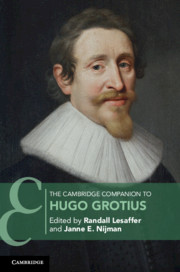Book contents
- The Cambridge Companion to Hugo Grotius
- Cambridge Companions to Law
- The Cambridge Companion to Hugo Grotius
- Copyright page
- Contents
- Contributors
- Preface
- Chronology
- Abbreviations and Short Titles of Works by Grotius
- Editions and Translations of Grotius’ Work
- Introduction
- Part I Grotius in Context
- 1 Life and Intellectual Development
- 2 Grotius as Legal, Political and Diplomatic Official in the Dutch Republic
- 3 Grotius and the East Indies
- Part II Concepts
- Part III Grotius as a Man of Letters, Theologian and Political Writer
- Part IV Grotius as a Legal Scholar
- Part V The Reception of Grotius
- Index
- References
3 - Grotius and the East Indies
from Part I - Grotius in Context
Published online by Cambridge University Press: 03 September 2021
- The Cambridge Companion to Hugo Grotius
- Cambridge Companions to Law
- The Cambridge Companion to Hugo Grotius
- Copyright page
- Contents
- Contributors
- Preface
- Chronology
- Abbreviations and Short Titles of Works by Grotius
- Editions and Translations of Grotius’ Work
- Introduction
- Part I Grotius in Context
- 1 Life and Intellectual Development
- 2 Grotius as Legal, Political and Diplomatic Official in the Dutch Republic
- 3 Grotius and the East Indies
- Part II Concepts
- Part III Grotius as a Man of Letters, Theologian and Political Writer
- Part IV Grotius as a Legal Scholar
- Part V The Reception of Grotius
- Index
- References
Summary
There has been much speculation about how much Grotius knew about Asian law and maritime trading customs, and at what stage in his early career he familiarized himself with them. This chapter divides Grotius’ early career (before 1618) into four stages, each corresponding to a phase in his intellectual growth on the subject of Asia at large. First, defending the Santa Catarina incident which saw him drafting De Jure Praedae (and with it implicitly Mare Liberum) before 1606/7; second, defending the VOC’s interests in the lead up to the Treaty of Antwerp and the Twelve Years Truce 1606/7-1609; third, acting as the intermediary for VOC admiral Cornelis Matelieff (Cornelis Corneliszoon Matelieff) 1608-1612/3, and participation in the Anglo-Dutch fisheries and colonies conferences of 1613 (London) and 1615 (The Hague). It is argued that in his various capacities in government and as advisor to the Dutch East India Company (VOC), Grotius broadened his knowledge about Asia in different ways, and through his services to the state and company helped lay the intellectual and foundations for what has been sometimes dubbed the First Dutch Empire (c.1605-1795).
Keywords
- Type
- Chapter
- Information
- The Cambridge Companion to Hugo Grotius , pp. 65 - 88Publisher: Cambridge University PressPrint publication year: 2021
References
Further Reading
- 1
- Cited by

